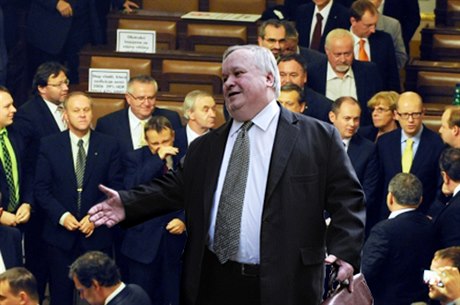The draft budget proposed by the Ministry of Finance envisions reducing allocations to the state intelligence service (BIS) by Kč 250 million over the next two years — a drastic reduction that former interior minister MP František Bublan (Social Democrats, ČSSD) says could lead to the spy service’s liquidation.
The BIS acts as a counter-intelligence service exposing foreign agents in the Czech Republic and is further charged with protecting the state's economic interest. This year its operating budget dropped from Kč 1.166 billion to Kč 1.149 billion, and, according to the Finance Ministry’s plan, will be reduced to Kč 1.02 billion next year and Kč 911 million in 2013.
How to justify the cuts?
Finance Minister Miroslav Kalousek (TOP 09) argues that all state institutions must cut back in order to bring the budget deficit to 2.9 percent of GDP in 2013 and 1.9 percent in 2014 with the goal of achieving a balanced budget in 2016, as was set out in the Program Declaration of the current center-right government (polls show it would be roundly defeated if parliamentary elections, set for 2014, where held now).
Kalousek’s spokesman, Ondřej Jakob, told Czech Position that while “specific details will be further discussed” the BIS is not exempt from the belt-tightening.
BIS director Jiří Lang is, of course, none too happy about it, and, according to a well-placed source, complained about it at a Senate hearing in May when leaks of wiretapped conversations between ex-Prague mayor Pavel Bém (Civic Democrats, ODS) and lobbyist Roman Janoušek were discussed. Lang fears BIS will need to lay off agents and scale back its operations.
This Wednesday (May 23), Lang is due to speak to members of the parliamentary security committee and spell out how the spy service allocated its budget last year. The usually tight-lipped BIS spokesman Jan Šubert is even protesting the proposed changes.
“All state institutions have been prescribed a diet. But for little money there is little work. We will have to focus on what is most important for the state. Some activities will have to be cut back,” he told Czech Position, declining to say how operations might be reduced. “We don’t want to show our cards to our opponents.”
On the edge
A veteran in the security sector, former head of the Office for Foreign Relations and Information (ÚZSI) and ex-interior minister František Bublan says he’s convinced the medium-term budget outlook can lead to the downfall of the BIS. “They can shut it down. We are already in a crisis situation. New people aren’t being hired and the technology is obsolete,” he said.
According to Bublan, the lion’s share of the BIS budget goes to salaries, which constitutes two-thirds of all spending on the intelligence services. “Even if all employees were discharged … according to the law, they would be entitled to 80 percent of their wages. And if they left, they would have to pay them pensions. This would save nothing,” he told Czech Position.
If the BIS is to really operate on an annual budget of less than Kč 1 billion, it will require the drafting of a total new concept of how the intelligence service works, the former interior minister said, adding the law would probably have to be amended to assign some tasks to other entities.
MP František Boháč (ODS), a member of the parliamentary security committee, doesn’t consider the situation to be quite so dire, but acknowledges options must be carefully considered. “The Ministry of Defense and firefighters are also economizing. But when it comes to the intelligence services it is particularly sensitive. There will be much to consider,” he said.
If not for the state, then against it!
For his part, shadow interior minister Jeroným Tejc (ČSSD) says “the service will be paralyzed” if the BIS budget is reduced by Kč 250 million. “Paradoxically, those seeking to make the cuts … are looking to make the largest savings – thanks to BIS – in the now high-quality protection of the economic interests of the state. Minister Kalousek, who is an expert in intelligence, is well aware of this. It is irresponsible of him [to push for these cuts],” Tejc told Czech Position. ‘If they [intelligence agents] are not working for the state, they may work against it.’
The ČSSD deputy points to another potential threat to state security. “If they lay off experienced agents, it will mean one thing. If they are not working for the state, they may work against it,” he said.
For an example of this in practice, one need look no further than the Bém–Janoušek case; according to Czech Position’s sources, in all likelihood, the sensitive transcripts were “leaked” from BIS to the private security agency ABL, founded by the head of the Public Affairs (VV) party, and then to the daily Mladá fronta Dnes by a former BIS agent.
Unlike Bublan, another former ÚZSI head, Karel Randák, does not see a disaster in the making if the BIS is due to face cuts. In fact, he maintains the spy service could benefit from the cuts. “It would just concentrate on what is truly important. Mandatory spending makes up 85 percent of the budget. For one operative there are two in the back office, which is too many. I would try to bring the ratio closer to one-to-one,” Randák told Czech Position. “A smaller budget would certainly then suffice.”





